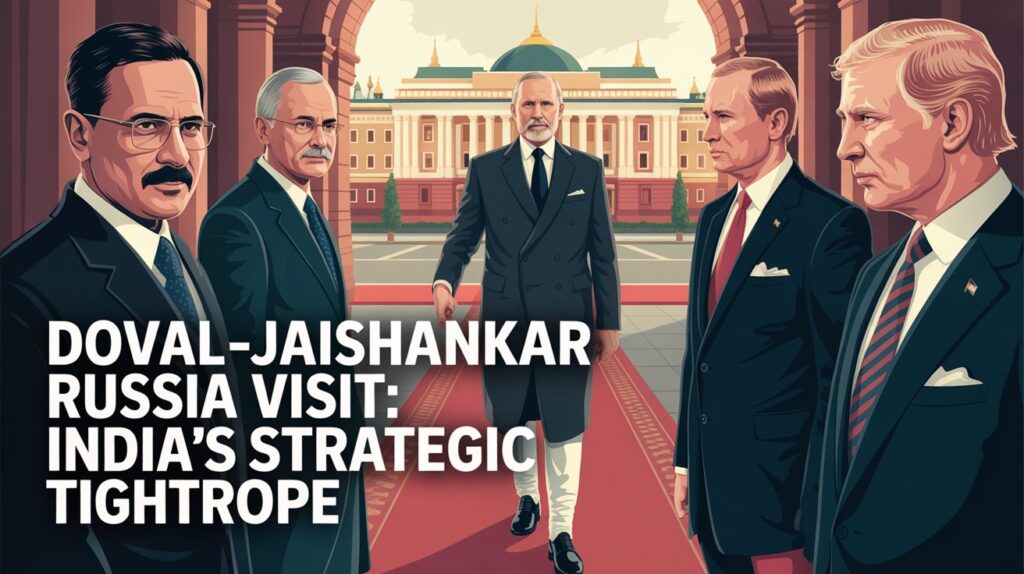Doval-Jaishankar Russia Visit 2025: India’s top security and foreign policy chiefs, Doval-Jaishankar Russia visit amid deepening defence ties, oil deals, and U.S. pressure. What does this bold diplomatic move mean for India-Russia relations?
🧭 Doval-Jaishankar Russia Visit: A Strategic Mission in a Divided World
In a bold diplomatic signal, India’s National Security Advisor Ajit Doval and External Affairs Minister S. Jaishankar embarked on a Doval-Jaishankar Russia Visit that could redefine India’s foreign policy trajectory.
Against the backdrop of a fractured world order, India is playing a delicate balancing act between Moscow and Washington.
Their visit wasn’t just routine diplomacy — it was a diplomatic message. One that echoed India’s commitment to strategic autonomy while refusing to be boxed in by Cold War binaries.
🕰️ Context: Why This Doval-Jaishankar Russia Visit Now?
The Doval-Jaishankar Russia Visit comes at a pivotal time:
- 🔺 The West is tightening sanctions on Russia.
- 🔻 India’s ties with the U.S. are evolving amid rising pressure on defence and energy dealings.
- 🛢️ India remains Russia’s top oil buyer, raising eyebrows in Washington.
With the war in Ukraine stretching into its third year and global supply chains under stress, this visit signals that India-Russia relations remain deeply relevant.
Also Read:
⚙️ Defence Deals in the Spotlight
A major highlight of the Doval-Jaishankar Russia Visit was high-level defence cooperation talks:
- 🇷🇺 S-400 Missile System: India reaffirmed its commitment to fully operationalise the long-range system despite U.S. CAATSA sanctions.
- ✈️ SU-57 Fighter Jet Discussions: Talks included technology transfer and future co-development under Make in India.
- 🛠️ Joint Military Production: Focus on spares and maintenance for T-90 tanks and Sukhoi jets.
This visit underlined that India-Russia defence ties go far beyond arms purchases — it’s a partnership built on decades of trust.
🛢️ Oil Diplomacy: The Quiet Powerplay
Another major agenda of the Doval-Jaishankar Russia Visit was energy cooperation:
- 🛢️ India’s purchase of discounted Russian crude now accounts for over 30% of its imports.
- 🏭 Nayara Energy (partially owned by Rosneft) emerged as a major conduit.
- 💰 Payments are increasingly being made in rupees and dirhams, bypassing U.S. dollar dominance.
Despite U.S. displeasure, India is firm on prioritising energy security and economic pragmatism.
🔍 FAQ Highlights
Q: Why is the Doval-Jaishankar Russia visit significant?
👉 It signals India’s balanced diplomacy, maintaining strategic ties with Russia while navigating U.S. expectations.
Q: What role does oil play in India-Russia relations?
👉 Oil is now the backbone of the economic relationship, with India benefiting from discounted Russian crude.
Q: Did the U.S. react to the visit?
👉 While the U.S. has expressed concerns over India’s Russian ties, India maintains its sovereign right to chart its own policy.
Q: What are the defence implications of the visit?
👉 It deepens military collaboration, with long-term implications for co-production, technology sharing, and strategic deterrence.
🧠 Strategic Insights: India’s Diplomatic Balancing Act
The Doval-Jaishankar Russia Visit reinforces a key element of Indian foreign policy — non-alignment 2.0.
In an era of polarising blocs, India is pursuing multi-alignment, securing its interests with multiple power centres:
- 🤝 Russia for defence and energy
- 🌎 U.S. for technology and investment
- 🇫🇷 France for strategic autonomy in Indo-Pacific
This balancing act is what makes India a pivotal force in the multipolar world.
🏁 Conclusion: Bold Moves in Volatile Times
The Doval-Jaishankar Russia Visit was more than diplomacy — it was strategic signalling. India is telling the world it will partner with powers on its own terms.
With growing U.S.–China rivalry and shifting power centres, India’s nuanced diplomacy is keeping its options open — and its interests protected.
📌 Doval-Jaishankar Russia Visit Recap Table
| Aspect | Key Takeaways |
|---|---|
| Focus | India’s strategic visit to Russia |
| Key Figures | Ajit Doval, S. Jaishankar |
| Defense | S-400, SU-57, joint production |
| Energy | Discounted oil, rupee payments |
| Message to the World | India maintains sovereignty in foreign policy |
| U.S. Concerns | CAATSA sanctions, geopolitical friction |
❓ FAQs on Doval-Jaishankar Russia Visit 2025.
Q1: What was the main goal of the Doval-Jaishankar Russia Visit?
To strengthen defence, energy, and geopolitical ties with Russia amid global tensions.
Q2: How does this visit affect India-US relations?
It creates friction but also reflects India’s determination to stay independent.
Q3: Is India violating any sanctions through this cooperation?
No, India operates within international law while maximising its strategic interests.
Q4: Will this visit lead to new defence projects?
Potentially yes, especially in the co-development of next-gen weapons systems.
Q5: Is this a shift back to Cold War-era alliances?
Not quite. It’s a strategic realignment — not a return to binary blocs.
🔗 Related Articles from GeoInflux
- 🔍 How India navigates Western sanctions while deepening energy ties with Russia.
- 🧨 Trump’s war talk and how it plays into India’s regional security strategy.
- ⚠️ Strategic pressure tactics and Russia’s nuclear deterrence posture.
📚 References
All data and claims have been curated from credible and publicly available sources:
- Ministry of External Affairs – India
- TASS Russian News Agency
- The Hindu – India-Russia Relations
- Reuters – U.S. Sanctions & India-Russia Ties
- Economic Times – India’s Oil Deals with Russia
- Al Jazeera – Global Geopolitical Analysis
- South China Morning Post – Indo-Pacific Dynamics
- CSIS – Center for Strategic and International Studies
🙏 A Note of Thanks to Our Readers
At GeoInflux, we are grateful for your continued trust in our coverage of complex geopolitical developments. Your support motivates us to dig deeper, report smarter, and bring clarity to global power shifts.
Thank you for being part of our informed community.
If you found this article insightful, don’t forget to share it, leave a comment, or follow us on social media for real-time updates.

